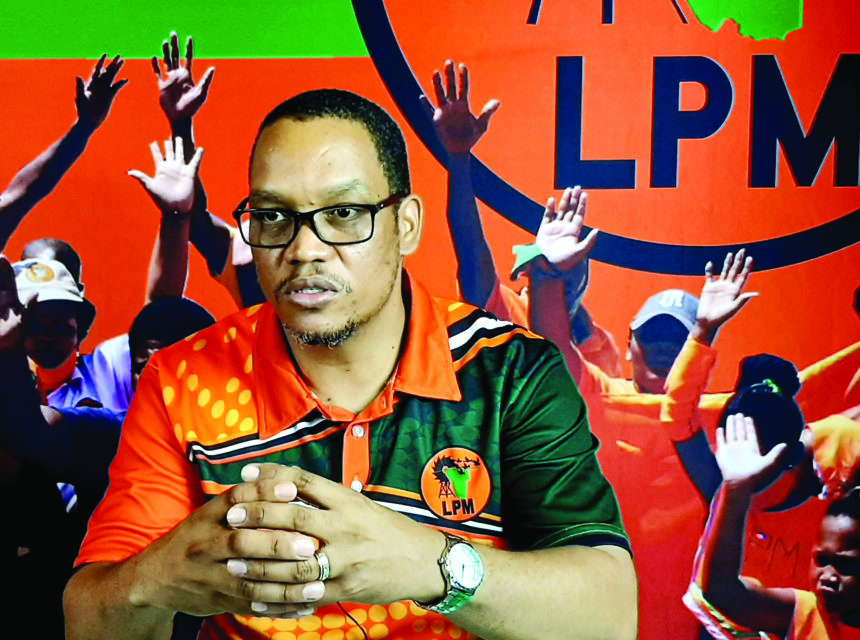Landless People’s Movement leader Bernadus Swartbooi has vowed that his party will never deviate from addressing the plight of landless Namibians.
At the centre of LPM’s land fight, Swartbooi said, are those affected by the issue of ancestral land. Swartbooi was speaking in Omaheke region at the weekend, where he held public meetings – one at Gobabis and the other at Otjinene.
“One of the most critical issues is land, and here in Omaheke, a lot of land was taken from the Tswana community and others, and today they are crowded on small plots. This [overcrowding] makes it very difficult for them to farm productively, and it also leads to land
degradation. The LPM remains true and committed to the struggle for land and to ensuring our people are empowered to farm at a scale where they can support their livelihoods,” he said.
During the rallies, Swartbooi touched on a raft of key issues the party plans to address once voted into power during this year’s elections.
The LPM remains a vocal advocate of land restitution and restorative justice for those dispossessed of their land, including indigenous communities.
The movement, which was formed as a haven for landless Namibians around 2017 before being registered with the Electoral Commission of Namibia as a political party in February 2019, currently has four seats in Parliament.
At Otjinene and Gobabis, Swartbooi’s message was consistent on the return of ancestral land to the dispossessed and on the upliftment of communities through improved agriculture production and mechanisms.
Swartbooi said it is time for the region’s inhabitants, especially the youth, to choose and vote wisely in the upcoming elections for the desired change to come about, and he insisted LPM was their only hope.
“You can’t speak of economic emancipation without addressing the land issue. As the LPM, we shall never abandon the fight for land, and you as the residents of Omaheke region must be prepared and ready to hold hands with the LPM to continue the fight for the full return of our land to the people. I’m sure you all agree with me that history and time have proven that all these liberation movements, such as Swapo and others in the SADC region, have lost direction and are now busy destroying our countries. Just look at Zimbabwe and what Zanu-PF, as a liberation movement, did there; it’s sad, and now Swapo is busy doing the same here.”
Land reform
Land reform remains a heated political and economic issue in Namibia, with many dispossessed Namibians still struggling to secure a piece of land to call home.
Through the resettlement programme, farms obtained by the government for resettlement are usually split into several portions, and dozens of families are resettled on what had previously been one farm.
The transfer of commercial agricultural land is, however, not directly conducted by the government. Would-be farmers with a previously disadvantaged background obtain commercial agricultural land privately or through affirmative action loans. In both cases, the “willing buyer, willing seller” principle applies.
Without compensation
Meanwhile, LPM’s chief whip in the National Assembly, Utaara Mootu, tabled a notice of motion on the expropriation of land owned by absentee landlords without compensation.
“I hereby give notice that on 17 September 2024, I shall table a motion on the expropriation of land of foreign absentee landlords without compensation in Namibia,” Mootu told the House.
She added: “Cognisant of the property rights enshrined in Article 16 of the Namibian Constitution and Article 17 of the Universal Declaration of the Rights and Duties of Man, absentee landlords have benefitted for too long at the expense of native Namibians. The post-colonial government in its current state serves the growing interests of foreign nationals that reside outside, at the expense of those who have lost land as a result of land dispossession.”
Further, she said, the National Resettlement Policy 2023-2033 tabled by land reform minister Calle Schlettwein earlier demands that farmers should have an inflow of up to N$2 million to qualify for resettlement farms.
“This, in its nature, is an ultra-right policy that further perpetuates land inequality and benefits the political elites and rich friends disregarding the black majority. Due to the demands of the criteria, we proposed a truly transformative leftist approach to land distribution that prioritises the empowerment of the masses,” Mootu said.
She said her motion is aimed at ensuring that a critical national asset is not left idle or exploited by those who do not contribute to our nation’s growth.
“The era of foreign exploitation is over. Our land will be reclaimed for the benefit of our people,” she said, setting the tone for what is expected in her motion next week.
-ohembapu@nepc.com.na


